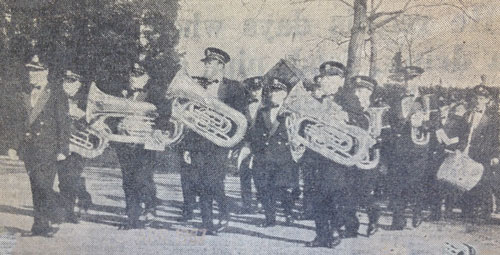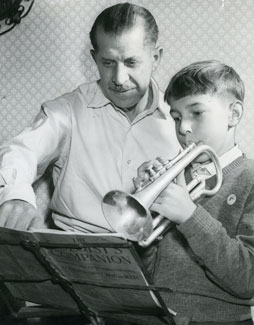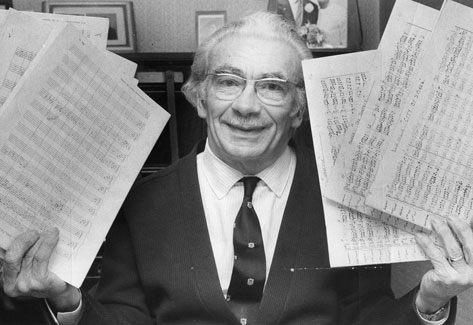Band History
As Oxfordshire’s longest established brass band we have a rich, varied and sometimes confusing history.
Brass band competitions since 1922
Success at Belle Vue 1930
Contesting began in 1922. Since that time there have been some great successes notably in the championship section of the National Brass Band Association in 1987, its centenary year, and, still in the first section, in 1994. 1997 was another peak, when the band under Nigel Taken scooped eight trophies in five months and became London Southern Counties Champions in March. In 1995 the training band came sixth in the regional qualifying contest of the National Brass Band Championship. Since the millennium, they have regularly entered the annual brass festival of the Oxford and District Brass Band Association as quartets, winning merits for their playing in 2003 and 2004.
In March 2013 we came third out of seventeen contesting bands in the fourth section and so qualified for the National finals in September 2013 where we came 9th in Section 4 out of 19. In March 2014 we came 2nd in Section 4 thereby earning promotion to Section 3 and another coveted invitation to perform at the National Championships at Cheltenham in September 2014.
As well as competing, from 1926 to 1970 the band held an annual brass band contest at Oxford Town Hall.
Contest Resuts
The City of Oxford Silver Band has been contesting since 1922. This page lists known results. Additions and corrections are welcome.
Band tours of Europe and America since the 1950s
Touring overseas began with a visit to Holland in 1957 when COSB marched to the Airborne Cemetery at Arnhem.

Marching at Armhem in 1957
The band went on a tour of France and West Germany in 1973. It was on this tour that Heinrich Walter, band leader of Nordlingen’s brass band composed The City of Oxford Silver Band March for the visitors from Oxford. This piece is always in the band’s repertoire. In 1976, they ventured as far as USA and Canada. Later trips were to Bonn in 1987 and Wilitz, Luxembourg in 1988.
The City of Oxford Youth Band tour Norway in the 1970s
Terry Brotherhood, Speaking on BBC Radio Oxford, describes the 1976 tour of the USA and Canada…
Musical tuition for all ages
Training as a regular activity began after the First World War. It was the brainwave of Charles Clifton, the band’s secretary of the time, who imported a coach, Tommy Wornall, from London to improve playing. At the same time, a trombone player called Walter Coppock formed a group of twenty youths to start playing brass instruments from scratch, amongst whom was one Jim Alder who joined in 1918 and was a member, off-and-on until his death in 2004 – read his memories of the band. After strenuous efforts, they were promoted to play with the experienced players, who had been much depleted and weakened by war service. This approach to nurturing new talent flourished especially in the 1950s, 60s and 70s under the leadership of Alder and Nobby (Cyril) Challis. Challis, who had first joined the band in 1936, and was especially interested in getting young people involved in musical training and oversaw a huge expansion in the organisation.
Nobby Challis recorded at the Pressed Steel Company in about 1974.


Left: Cyril ‘Nobby’ Challis teaching Ivor Parker in 1959; Right: Jim Alder
(Courtesy of Oxford Mail)
1970 : The City of Oxford Youth Band playing at the inaugural Kennington Overseas Aid week, conducted by Nobby Challis.
(Filmed by David Green, Courtesy of KOA, Clive Rodgers)
1966: ATV reporter David Lloyd meets members of the City of Oxford Junior Band being taught by Cyril “Nobby” Challis.
(Courtesy of MACE Archive / ITV)
Finding a home of our own
Left: The Britannia Inn on London Road, Headington; centre: The Carpenter’s Arms, Hockmore Street, Cowley (courtesy of Oxford Mail); right: The Milham Ford School hut used by the band in the 1950s
The band had no permanent home until 1966. Prior to that the band had rehearsed in a plethora of locations across the city. These include the Field School (Headington, now St Andrews CE Primary), a clubroom at The Britannia Inn, Headington; a hut at the Wingfield Hospital (Headington); The Cape of Good Hope, on The Plain, Oxford (from 1925); The Cowley Road Picture Palace, The Magdalen Arms, Iffley Road; The Carpenters Arms, Hockmore St, Cowley; The Cowley Workers Social Club; Bedford House, Cowley (The Cowley Community Centre); a hut originally built for Milham Ford School at Cowley Place and later used by Magdalen College School and subsequently dismantled and laboriously re-erected by band members in Cowley (1957); finally a canteen at the former Cowley Barracks (1963).
The Silver Band Hall
When Alderman Parker became Lord Mayor of Oxford in 1963, he chose the homeless musicians as his good cause for the year. The result was that in January 1966 he laid the foundation stone of the present band hall which opened in October of the same year.
Amicitia Per Musicam
Playing in public, whether for a fee or to support a charitable cause, has always been the core activity of the band. The Rules of the Headington Silver Prize Band of 10th March 1937 define its aims as ‘to promote and maintain in the district a first class Amateur Band, to foster the spirit of Good Fellowship among the Members and to obtain for all Members all possible advantages consequent upon organised combination.’ From the point of view of the band’s motto, ’Friendship through music’ or ‘Amicitia per musicam’ if you like it in Latin, probably the most curious rule was ‘All are asked to refrain from commenting on the efforts of any other Member.’ Presumably, that was the conductor’s job!
Village feasts, playing for dances and the temperance connection are strands of the band’s life that have now vanished. On the other hand, women and girls are now playing members. In the photograph which accompanied the programme of the 75th anniversary celebrations in 1962, all the members were men and youths. By 1975, when the Youth Band broke the World Record for continuous playing by keeping going for 28 hours 45 minutes under Nobby Challis’s baton, girls were among those who took part.
In June 2011 COSB played at the 10th anniversary of Prime Minister David Cameron becoming MP for Witney.
Over the years of its existence, COSB has amassed a large library of brass band music, running to at least 44 filing cabinet drawers, and a collection of brass instruments for members to use. It offers young people the chance to try to play an instrument their parents would never buy them on a whim, like the tuba or a bass trombone. Above all, it offers members the chance to play cheerful music regularly with other people, for other people.
If you know more about the history of the band or were a past member please get in touch.